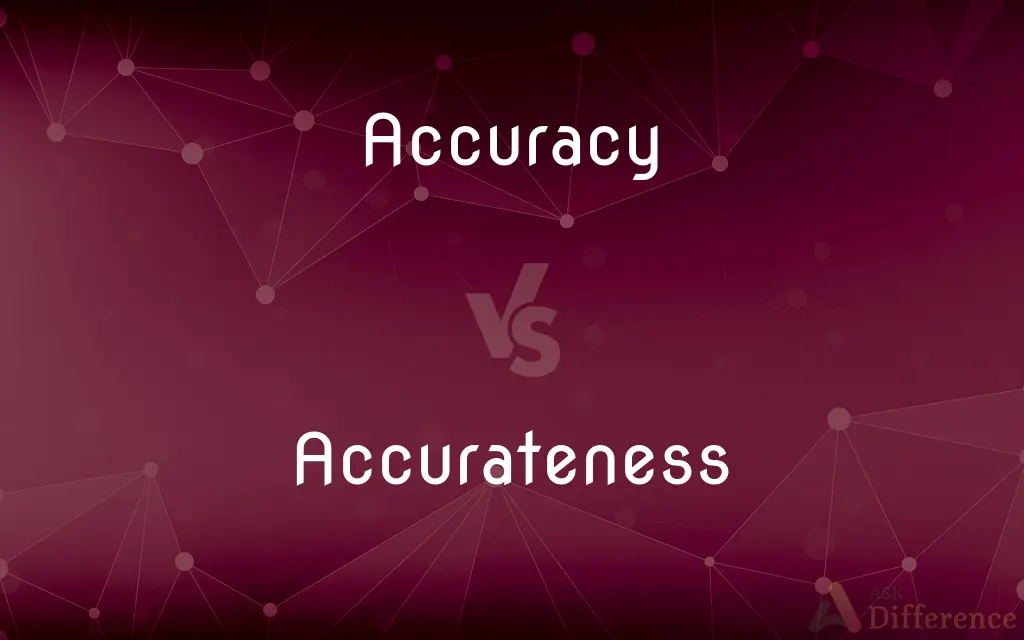Accuracy vs. Accurateness — What's the Difference?
By Maham Liaqat & Urooj Arif — Updated on March 22, 2024
Accuracy refers to the closeness of a measurement to its true value, while accurateness is less commonly used but can imply the quality of being accurate.

Difference Between Accuracy and Accurateness
Table of Contents
ADVERTISEMENT
Key Differences
Accuracy is a term widely used in various fields such as science, engineering, statistics, and everyday life to denote the precision and correctness of an outcome or measurement in relation to a standard or true value. For example, in archery, hitting the bullseye is considered highly accurate. Accurateness, while technically synonymous with accuracy, is less frequently used and might be employed to describe the general characteristic of being accurate in broader, sometimes more qualitative contexts.
The concept of accuracy is critical in measurements, data collection, and analysis, ensuring that results are valid and reliable. High accuracy in scientific experiments, for instance, is crucial for the validity of the findings. Accurateness, when used, might refer to the overall tendency or consistency in achieving accuracy, though this usage is less standardized and might vary by context or preference.
Accuracy is often paired with precision, another important concept that refers to the consistency of repeated measurements. A measurement system can be accurate but not precise, precise but not accurate, both, or neither. The term accurateness, however, does not have a commonly recognized counterpart in this sense and is generally not used in the technical discussion of measurement error and consistency.
In documentation, reporting, and communication, accuracy is emphasized as a key quality, ensuring that information is correct and can be relied upon. The use of accurateness in such contexts is rare and might be seen as stylistic or emphasizing the characteristic of being accurate in a broader, more abstract sense.
Understanding the preference for accuracy over accurateness in technical and everyday contexts helps in clear communication and the setting of standards for measurement and performance. While accuracy is a cornerstone in many disciplines for quantifying the closeness to truth, accurateness, when used, often reinforces the concept of accuracy in a more qualitative or characteristic manner.
ADVERTISEMENT
Comparison Chart
Definition
The closeness of a measurement to its true or accepted value
Less commonly used, can imply the quality or state of being accurate
Common Usage
Widely used in scientific, technical, and everyday contexts
Rarely used, may appear in more qualitative descriptions
Associated With
Measurements, experiments, data collection
General characteristic or quality of being accurate
Precision Pairing
Often discussed alongside precision
Lacks a commonly recognized counterpart in technical discussions
Importance
Essential for validity and reliability in various fields
Usage is less standardized and varies by context
Compare with Definitions
Accuracy
Used to assess the performance of instruments or systems.
The new GPS model boasts enhanced accuracy in tracking locations.
Accurateness
The condition or quality of being accurate; correctness.
The accurateness of his predictions earned him respect among his peers.
Accuracy
The degree to which the result of a measurement conforms to the correct value or a standard.
The accuracy of the laboratory tests is critical for the diagnosis.
Accurateness
Sometimes used to describe the careful attention to detail in work or activity.
The craftsperson's accurateness was evident in the intricate details of the jewelry.
Accuracy
The correctness or truthfulness of information or data.
The historian checked multiple sources to ensure the accuracy of the dates mentioned in the book.
Accurateness
Less frequently used in technical or scientific contexts, more common in qualitative descriptions.
The novel's accurateness in depicting historical events impressed the readers.
Accuracy
Critical in research and development for achieving valid results.
Accuracy in data collection is fundamental for the research's success.
Accurateness
Can be synonymous with accuracy in general use, though less commonly employed.
His accurateness in financial forecasting contributed to the company's success.
Accuracy
In the context of aiming or targeting, the ability to reach the intended target or outcome.
The archer's accuracy improved with practice, hitting the bullseye more frequently.
Accurateness
May be used in a more abstract sense to describe the general precision or reliability of something.
The accurateness of the narrative was questioned by critics.
Accuracy
The quality or state of being correct or precise
We have confidence in the accuracy of the statistics
Accurateness
Conforming exactly to fact; errorless.
Accuracy
Conformity to fact.
Accurateness
Deviating only slightly or within acceptable limits from a standard.
Accuracy
Precision; exactness.
Accurateness
Capable of providing a correct reading or measurement
An accurate scale.
Accuracy
The ability of a measurement to match the actual value of the quantity being measured.
Accurateness
Acting or performing with care and precision; meticulous
An accurate proofreader.
Accuracy
The state of being accurate; being free from error; exactness; correctness
Accurateness
The state or quality of being accurate; accuracy
Accuracy
Exact conformity to truth, or to a rule or model; degree of conformity of a measure to a true or standard value.
The jury doubted the accuracy of the witness' comments.
Accurateness
The state or quality of being accurate; accuracy; exactness; nicety; precision.
Accuracy
The state of being accurate; freedom from mistakes, this exemption arising from carefulness; exact conformity to truth, or to a rule or model; precision; exactness; nicety; correctness; as, the value of testimony depends on its accuracy.
The professed end [of logic] is to teach men to think, to judge, and to reason, with precision and accuracy.
The accuracy with which the piston fits the sides.
Accuracy
The quality of nearness to the truth or the true value;
He was beginning to doubt the accuracy of his compass
The lawyer questioned the truth of my account
Accuracy
(mathematics) the number of significant figures given in a number;
The atomic clock enabled scientists to measure time with much greater accuracy
Common Curiosities
Is accurateness used in scientific measurements?
While "accurateness" might be understood, "accuracy" is the preferred term in scientific and technical measurements.
Can a measurement be accurate but not precise?
Yes, a measurement can be close to the true value (accurate) but not consistently repeatable (precise).
Does accuracy only apply to numerical data?
No, accuracy can also apply to the correctness of qualitative information, like historical facts or descriptions.
Is "accurateness" just another word for "accuracy"?
Technically, yes, but "accuracy" is the term more commonly used, especially in scientific and technical contexts.
Why is accuracy important in research?
Accuracy is crucial in research to ensure that conclusions drawn from data are valid and reliable, reflecting the true nature of what is being studied.
Can the accuracy of information change over time?
Yes, as new information or research becomes available, the perceived accuracy of previously accepted facts can change.
How can one improve the accuracy of measurements?
Improving measurement accuracy can involve calibrating instruments, using more precise tools, or refining measurement techniques.
How is accuracy different from truthfulness?
Accuracy relates to the closeness to a known or accepted value, while truthfulness is more about honesty and integrity in reporting or stating facts.
Why might someone use "accurateness" instead of "accuracy"?
They might use "accurateness" for stylistic reasons or to emphasize the characteristic quality of being accurate, though it's less common.
Are there tools to measure the accuracy of a device or instrument?
Yes, calibration devices and standards are used to measure and adjust the accuracy of various instruments and devices.
Share Your Discovery

Previous Comparison
Fireplace vs. Mantelpiece
Next Comparison
Chalk vs. LimestoneAuthor Spotlight
Written by
Maham LiaqatCo-written by
Urooj ArifUrooj is a skilled content writer at Ask Difference, known for her exceptional ability to simplify complex topics into engaging and informative content. With a passion for research and a flair for clear, concise writing, she consistently delivers articles that resonate with our diverse audience.














































